|
|
|
Sort Order |
|
|
|
Items / Page
|
|
|
|
|
|
|
| Srl | Item |
| 1 |
ID:
180568
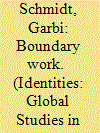

|
|
|
|
|
| Summary/Abstract |
Theoretically, this article investigates the politicisation of migration research in relation to boundary work between different spheres of the Danish public debate about migration, including research, media and politics. Empirically, the article analyses the roles that Danish migration researchers have played in such debates over the last two decades. Besides, the article presents and analyses results from a survey among migration researchers employed in four of Denmark’s six universities. The survey showed that while the majority of respondents did not feel unsafe participating in the public debate about migration, more than two out of five did. Jeopardising one’s professional reputation appeared to be a major concern. The article ends with a discussion of the survey results in relation to academic boundary work and presents suggestions for the road ahead, both for individual researchers and academic institutions.
|
|
|
|
|
|
|
|
|
|
|
|
|
|
|
|
| 2 |
ID:
180571


|
|
|
|
|
| Summary/Abstract |
This paper looks at how research communication in Norwegian migration and diversity research has changed over time. The main themes in the analysis are researchers’ motivations to enter the field and their experiences of, and reactions to, critique from colleagues and other audiences. Theory about credibility contests and boundary work on the interface of the academia and media, along with ideas about explicit and implicit normativity, inform the analysis. A main conclusion is that, as the field has matured, contests over normativity have changed from internal contests over implicit normativity to external charges of explicit normativity. The empirical analysis builds on 31 interviews with Norwegian researchers about their experiences of, and views on, public research communication in newspapers, social media, radio, TV and face-to-face panel debates. The interviewed researchers are of different age, gender, and ethnicity and they work in 10 different universities and research institutes across Norway.
|
|
|
|
|
|
|
|
|
|
|
|
|
|
|
|
| 3 |
ID:
180572
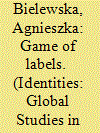

|
|
|
|
|
| Summary/Abstract |
The aim of this paper is to explore the identification choices of highly skilled migrants employed by companies in the Wałbrzych Special Economic Zone in south-west Poland in order to discuss how their identity is constructed and performed, especially how conflictual identifications are managed. Analysis of qualitative data shows the migrants call both their place of origin and their new place of life home. They identify as inhabitants of their new city and talk about gaining some traits of Polish national identity but they stress strong national identity related to their home country. Conflicts of loyalties in these hybrid identities are solved through a label game. Migrants identify with groups at different scales, from local groups, through city and national, to supranational. By playing with the scale of groups they can avoid conflicting identifications.
|
|
|
|
|
|
|
|
|
|
|
|
|
|
|
|
| 4 |
ID:
180566
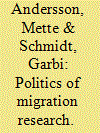

|
|
|
|
|
| Summary/Abstract |
This special issue focusses on how migration and diversity researchers experience and perform their role as academic experts in politicised public debates about migration and diversity. In a world wherein experts are increasingly demanded for policy development and wherein migration as well as ethnic, racial and religious diversity are among the themes dividing voters the most, migration and diversity researchers find themselves in a challenging position. How do they view their obligation to participate in public debate and how does their identities as researchers relate to such participation? This special issue will discuss the impact and implications of these challenges in the Scandinavian context, although the theme of researchers’ roles in politicised public debate is of a broader relevance both to other geographical regions and to other controversial research fields. Debates on public sociology, on the science/media interface, and on present challenges to academic expertise more generally, are central to the discussion.
|
|
|
|
|
|
|
|
|
|
|
|
|
|
|
|
| 5 |
ID:
180569
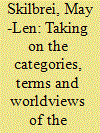

|
|
|
|
|
| Summary/Abstract |
Researchers have many incentives to make sure that the work they do is relevant to policymakers and implementers. First, it may secure them funding; second, ‘impact’ is part and parcel of academic evaluations; and third, researchers are often attracted by the prospect of doing work that matters and that contributes towards social justice. Moreover, the mandate and urge to be relevant are central to governments’ capacity to formulate effective and just policies, but this may also constitute an epistemological challenge by creating blind spots. In this article, I explore key challenges that emerge from the relationship between policy and research. I take as a starting point my own experiences as a migration scholar, who mainly conducts research on migration to Norway and the development and implementation of Norwegian migration policies, and use these to reflect on the consequences of external and internal pressures on research to be relevant and have an impact.
|
|
|
|
|
|
|
|
|
|
|
|
|
|
|
|
| 6 |
ID:
180570
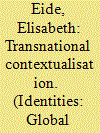

|
|
|
|
|
| Summary/Abstract |
This article discusses experiences harvested when communicating migration research from an academic position as media researcher, partly influenced by other positions. It discusses transnational literacy illustrated by the case of Afghanistan and Afghan refugee experiences, arguing for a more holistic contextual approach to the phenomenon of flight and all its processes. A critical human rights perspective in media research proves useful guidance to approaching marginalisation and the ‘silenced other’. This also entails a critical approach to methodological nationalism and media domestication, and ‘unlearning privilege as loss’. Furthermore, it discusses how researchers within certain fields (such as migration) may be associated with (or accused of) political correctness.
|
|
|
|
|
|
|
|
|
|
|
|
|
|
|
|
| 7 |
ID:
180567


|
|
|
|
|
| Summary/Abstract |
What makes a migration expert? Taking Bourdieu’s understanding of the academic field as its point of departure, this article outlines the field of migration research in Denmark. Migration and integration are heavily politicised topics in Denmark as in many other countries. The migration field has also been influenced by this politicisation. The migration research field is an open field which means that academic knowledge producers are not the only actors within this field. Neither are they necessarily the ones recognised the most. The article outlines different types of experts which in different ways signal a change of hierarchies within the field. Not the only one but the dominating ones. The last years we have seen a research field characterised by different academic positions but also an expansion of the field with an increased importance given to boundary organisations. The article discusses what the implications for doing migration research might be.
|
|
|
|
|
|
|
|
|
|
|
|
|
|
|
|
|
|
|
|
|